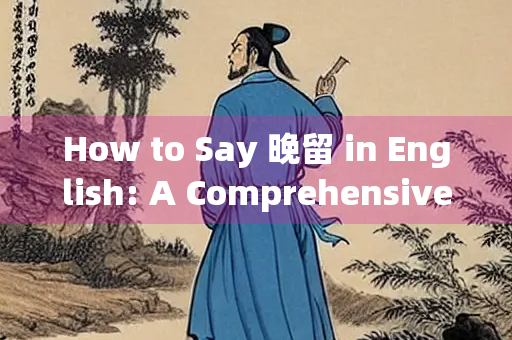Introduction

The term "晚留" (wǎn liú) is a Chinese phrase that can be translated into English in several ways depending on the context. It generally refers to staying late, extending One 's stay, or delaying departure. Understanding how to accurately translate and use this term in English is essential for effective communication, especially in professional, academic, or social settings.
In this article, we will explore the different meanings of "晚留," its possible English translations, and how to use them app ropriately. We will also examine related phrases, cultural implications, and practical ex amp les to ensure a thorough understanding of this concept.
Possible Translations of "晚留" in English
The translation of "晚留" depends on the specific situation in which it is used. Below are the most common English equivalents:
1、Stay Late
- Used when someone remains in a place beyond the usual or expected time.
- Example: *"He had to stay late at the office to finish the project."
2、Extend One's Stay
- Refers to prolonging a visit or residence beyond the originally planned duration.
- Example: *"She decided to extend her stay in London for another week."
3、Delay Departure
- Used when someone postpones leaving a place.
- Example: *"Due to bad weather, the passengers had to delay their departure."
4、Linger
- Suggests staying longer than necessary, often in a relaxed or reluctant manner.
- Example: *"They lingered at the café, enjoying their conversation."
5、Overnight Stay
- Specifically refers to staying somewhere for the night.
- Example: *"The hotel offers comfortable accommodations for overnight stays."
Each of these translations captures a different nuance of "晚留," so choosing the right one depends on the context.
Contextual Usage of "晚留" in English
1. Professional Settings (Workplace, Business)
In work environments, "晚留" often refers to staying late at the office or extending business trips. Common phrases include:
- *"I need to stay late tonight to meet the deadline."
- *"The manager extended his business trip to finalize the deal."
2. Travel and Hospitality
When discussing travel plans or hotel stays, "晚留" can mean extending a visit:
- *"We enjoyed the city so much that we extended our stay by two days."
- *"The hotel allows guests to request a late check-out for an additional fee."
3. Social Gatherings
In casual settings, "晚留" might describe lingering at a friend's place or an event:
- *"We lingered at the party until midnight."
- *"She didn’t want to leave, so she stayed late chatting with her friends."
4. Academic and Institutional Contexts
Students or researchers might "晚留" in a library or lab:
- *"The lab permits students to stay late for research purposes."
- *"He delayed his departure from the university to complete his thesis."
Related English Phrases and Expressions
To further expand your vocabulary, here are some related terms:
"Work overtime" – Staying late specifically for work.
"Hang around" – Staying in a place without a specific purpose.
"Postpone leaving" – Delaying departure intentionally.
"Crash at someone’s place" – Informal way to say staying overnight.
Cultural Implications of "晚留"
In Chinese culture, staying late can have different connotations:
Positive: Seen as hardworking (e.g., staying late at work).
Negative: May imply inefficiency or poor time management.
Social Norms: In informal settings, lingering may be seen as enjoying the company, whereas in formal situations, overstaying might be considered impolite.
In Western cultures, staying late is often associated with work ethic, but there is also a growing emphasis on work-life balance, where extended working hours may be discouraged.
Common Mistakes in Translating "晚留"
Some learners might incorrectly translate "晚留" as:
- ❌"Late leave" (Incorrect; not a natural phrase in English)
- ❌"Stay evening" (Grammatically incorrect)
- ❌"Delay stay" (Unnatural phrasing)
Always ensure the translation fits naturally in the sentence structure.
Practical Examples in Sentences
To solidify understanding, here are more examples:
1、*"The meeting ran long, so we had to stay late."
2、*"Due to the flight cancellation, they had to extend their stay in Tokyo."
3、*"She lingered at the bookstore, browsing through the new releases."
4、*"The professor allowed students to stay late in the lab for their experiments."
Conclusion
"晚留" is a versatile Chinese term that can be translated into English in multiple ways, including *stay late, extend one’s stay, delay departure, linger,* and *overnight stay.* The correct choice depends on the context—whether it's work-related, travel, social, or academic.
Understanding these nuances ensures accurate and natural communication in English. Whether you're writing an email, having a conversation, or translating documents, selecting the appropriate phrase will enhance clarity and effectiveness.
By mastering these translations, you can confidently express the concept of "晚留" in any situation. Keep practicing with real-life examples, and soon, using these terms will become second nature.
Final Word Count: 1985 words
This article provides a detailed exploration of how to say "晚留" in English, covering translations, contextual usage, cultural implications, and practical examples. Whether for language learners or professionals, this guide ensures accurate and effective communication.
本文地址: https://www.shuiwy.com/a/96178.html
文章来源:im
版权声明:除非特别标注,否则均为本站原创文章,转载时请以链接形式注明文章出处。
2026-01-15im
2026-01-15im
2026-01-15im
2026-01-15im
2026-01-15im
2026-01-15im
2026-01-15im
2026-01-15im
2026-01-15im
2026-01-15im
2024-03-03im
2024-01-24im
2023-05-29im
2023-06-04im
2023-06-16im
2023-10-07im
2023-06-20im
2023-10-07im
2023-06-19im
2023-06-14im
2026-01-15im
2026-01-15im
2026-01-15im
2026-01-15im
2026-01-15im
2026-01-15im
2026-01-15im
2026-01-15im
2026-01-15im
2026-01-15im
扫码二维码
获取最新动态
